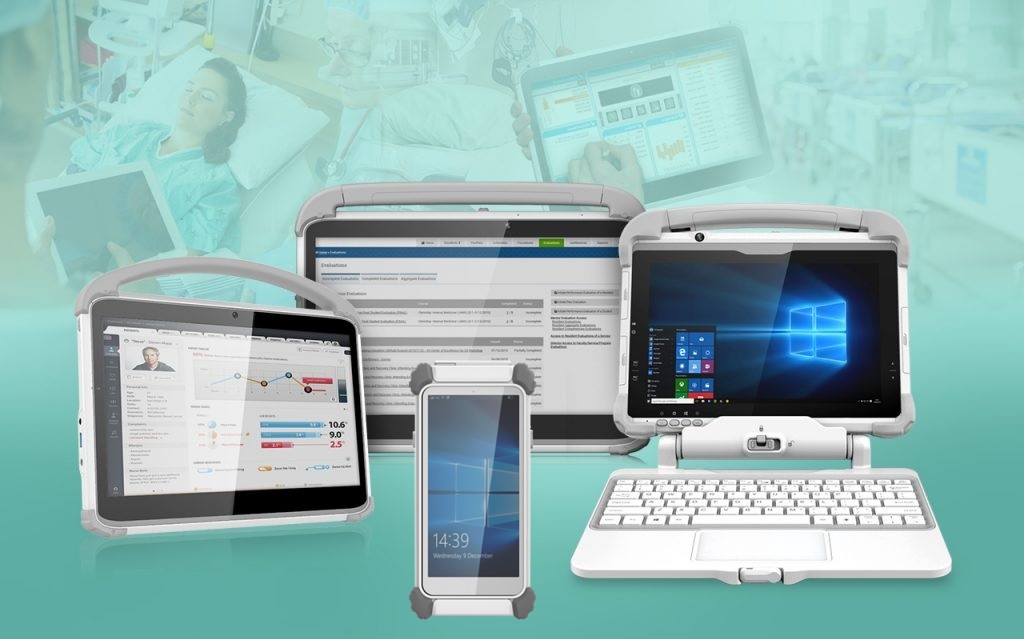
In modern fast-paced and high-security medical settings, particularly within defense health systems, the use of advanced technology such as medical tablets is transforming patient care and the handling of sensitive information. These durable and portable devices improve healthcare delivery and are essential for maintaining patient data confidentiality and security.
The Rise of Medical Tablets in Healthcare
Empowering Healthcare Providers
Medical tablets provide healthcare professionals with real-time access to critical patient data, clinical guidelines, and diagnostic tools. This immediate access enables clinicians to make well-informed decisions at the point of care, reducing medical errors and improving patient outcomes. The flexibility and mobility of these devices allow for seamless access to electronic health records (EHRs), lab results, and medical imaging, all crucial for accurate diagnosis and treatment planning
Enhancing Communication and Collaboration
Medical tablets facilitate enhanced communication and collaboration among healthcare providers. Features like secure messaging and telehealth capabilities enable real-time consultation with specialists, fostering better teamwork and coordinated care. This is particularly beneficial in defense health settings where timely and efficient communication can significantly impact patient care and safety.
Optimizing Patient Care in Defense Health Systems
Real-Time Data Access
In defense health systems, the ability to access real-time patient data is vital. Medical tablets offer this capability, allowing healthcare providers to swiftly assess patient conditions and make timely decisions no matter the location. The integration of point-of-care information tools ensures that clinicians have all necessary data at their fingertips, whether in a hospital setting or in the field during emergencies.
Improving Workflow Efficiency
The use of medical tablets streamlines workflows by eliminating the need for paper-based documentation and manual data entry. This efficiency frees up more time for direct patient care and reduces the administrative burden on healthcare providers. For defense health systems, where quick and accurate data management is crucial, this translates into better patient care and safety.
Ensuring Data Security and Privacy
Robust Security Features
Medical tablets are equipped with advanced security features such as data encryption, biometric authentication, and remote device management. These measures ensure that sensitive patient information is protected against unauthorized access and data breaches. For defense health systems, where data security is paramount, these tablets provide a secure platform for managing patient records and other critical information.
Compliance with Regulatory Standards
In addition to robust security features, medical tablets help healthcare providers comply with various regulatory standards such as the Health Insurance Portability and Accountability Act (HIPAA). This compliance is essential in defense health systems to ensure the confidentiality and integrity of patient data. By adhering to these regulations, medical tablets help maintain the trust and confidence of patients and healthcare professionals alike.
The Role of Medical Tablets in Defense Health IT
Enhancing Mobility and Accessibility
Medical tablets are designed to withstand the demanding conditions of healthcare environments, including exposure to liquids, dust, and physical impact. Their durability and portability make them ideal for use in defense health settings, where healthcare providers often need to move between different locations or respond to emergencies in challenging environments. This mobility ensures that critical information is always accessible, improving the overall quality of care.
Facilitating Interdisciplinary Collaboration
Medical tablets support interdisciplinary collaboration by providing healthcare teams with a shared platform for accessing and updating patient information. This capability is particularly important in defense health systems, where coordinated efforts between different healthcare providers and departments are essential for delivering comprehensive care.
Future Trends in Medical Tablets for Defense Health IT
Integration with Advanced Technologies
The future of medical tablets in defense health systems looks promising with the integration of advanced technologies such as artificial intelligence (AI) and machine learning. These technologies can enhance the capabilities of medical tablets by providing predictive analytics, real-time decision support, and personalized patient care plans. As these technologies continue to evolve, medical tablets will become even more integral to the delivery of high-quality healthcare.
Expansion of Telehealth Services
With the growing demand for telehealth services, medical tablets are set to play a key role in expanding access to remote care. For defense health systems, telehealth can provide a lifeline for patients in remote or underserved areas, ensuring they receive timely and effective medical care. Medical tablets equipped with telehealth capabilities will enable healthcare providers to offer consultations, monitor patient progress, and deliver care from anywhere, anytime.
Medical tablets are transforming the landscape of healthcare by providing a powerful tool for improving patient care and safeguarding sensitive information. In defense health systems, where the stakes are high, these devices offer a secure, efficient, and versatile solution for managing patient data and enhancing healthcare delivery. As technology continues to advance, the role of medical tablets in optimizing patient care and ensuring data security will only become more significant, paving the way for a future where quality healthcare is accessible to all.

